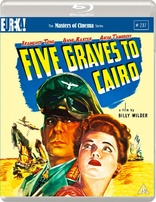Five Graves to Cairo Blu-ray Movie
HomeFive Graves to Cairo Blu-ray Movie 
Masters of CinemaEureka Entertainment | 1943 | 96 min | Rated BBFC: PG | Aug 17, 2020
Movie rating
7.1 | / 10 |
Blu-ray rating
| Users | 3.0 | |
| Reviewer | 2.5 | |
| Overall | 2.7 |
Overview
Five Graves to Cairo (1943)
The fate of Cairo is in the hands of a British corporal undercover in Rommel's headquarters.
Starring: Franchot Tone, Anne Baxter, Akim Tamiroff, Fortunio Bonanova, Peter van EyckDirector: Billy Wilder
| War | Uncertain |
| Thriller | Uncertain |
Specifications
Video
Video codec: MPEG-4 AVC
Video resolution: 1080p
Aspect ratio: 1.35:1
Original aspect ratio: 1.37:1
Audio
English: LPCM 2.0 Mono (48kHz, 24-bit)
Subtitles
English SDH
Discs
Blu-ray Disc
Single disc (1 BD)
Playback
Region B (locked)
Review
Rating summary
| Movie | 2.0 | |
| Video | 3.0 | |
| Audio | 4.5 | |
| Extras | 2.5 | |
| Overall | 2.5 |
Five Graves to Cairo Blu-ray Movie Review
Reviewed by Dr. Svet Atanasov September 29, 2020Billy Wilder "Five Graves to Cairo" (1943) arrives on Blu-ray courtesy of Eureka Entertainment. The supplemental features on the disc include vintage trailer for the film; new audio commentary by critic Adrian Martin; vintage radio adaptation from Lux Radio Theatre; and more. In English, with optional English SDH subtitles for the main feature. Region-B "locked".
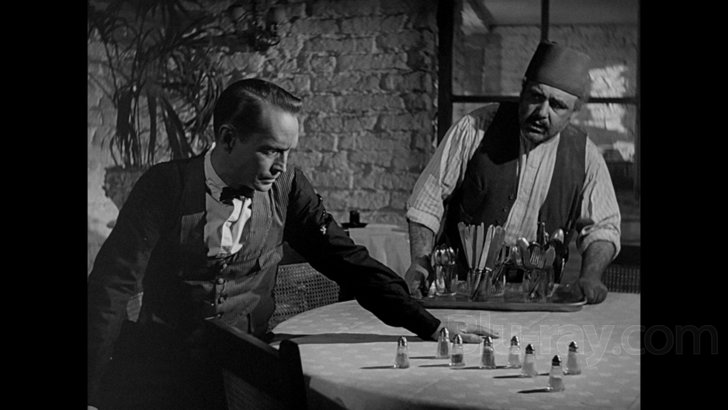
The biggest weakness of Billy Wilder’s Five Graves to Cairo is its inability to be even remotely objective. Obviously, the film was meant to function as a propaganda piece, but its characterizations are so ridiculous that the crucial contrasts that are supposed to shape up its message instantly become incredibly ineffective.
Consider Erich von Stroheim’s transformation as Field Marshal Erwin Rommel. Do you believe that the pompous fool that enters the old hotel in the desert could have won the Battle of Gazala? And can you see him as one of Adolf Hitler’s greatest military strategists? Of course not. Stroheim’a character is an awful caricature that is quite simply incompatible with the message of the film.
Billy Wilder and Charles Brackett’s original script, however, does not just ignore this glaring issue. It actually intentionally elevates Stroheim’s fictional character above the rest of the characters in the film and then demands that they openly admire his intellect. Needless to say, the drama that is supposed to flourish as a result of this demand is incredibly problematic. Franchot Tone’s impersonator, for instance, visibly struggles whenever he is around his nemesis because his mission -- copying the maps that can determine the outcome of the war in North Africa and transferring them to the British -- seems like a childish game with a predetermined finale. The script wants him to be fearful of the general and feverishly guessing his brilliant strategy to outmaneuver the British, but the closer he gets to him, the clearer it becomes that he is just an aging man who has to hide a number of laughable insecurities. It is an awful situation to be trapped in, and it is impossible to emerge from it looking credible.
To be a true Wilder film Five Graves to Cairo of course needs a lot of humor, which the script willingly delivers. The humor unquestionably hurts the drama, but as odd as it may sound it is actually what makes the film partially tolerable. Akim Tamiroff, the true star of the film, plays the desert hotel’s owner and brings in the type of energy his best work is remembered for. He is like a giant teddy bear that has accidentally landed in the film and out of respect for its creator decided to stay and do the best he can to make it look attractive. But much like Tone’s character he is completely and irreversibly compromised. Whenever he steps before the camera, he looks disappointingly disoriented, a stranger amongst strangers who have to pretend to be historic figures that never existed.
The final forty or so minutes are so awful that from time to time it feels like Wilder simply wrapped up different situations as best as he could and then rushed to the glorious finale. A ridiculous Italian general named Sebastiano (Fortunio Bonanova) is repeatedly seen embarrassing himself as a passionate singer, while his German partner Lt. Schwegler (Peter van Eyck) nearly loses his mind in the company of the emotionally available maid Mouche (Anne Baxter). A bunch of high-ranking British officers also stop by for a round of drinks with the man who has supposedly outsmarted them in the desert.
A bombastic score by Miklos Rozsa is used to give the film a powerful dramatic identity, but the only lasting impression it leaves is that it is entirely inappropriate.
*In 1944, the Academy recognized Five Graves to Cairo with Oscar nominations for Best Cinematography (John F. Seitz), Best Film Editing (Doane Harrison), and Best Art Direction-Interior Decoration (Bertram C. Granger, Hans Dreier, Ernst Fegte).
Five Graves to Cairo Blu-ray Movie, Video Quality 
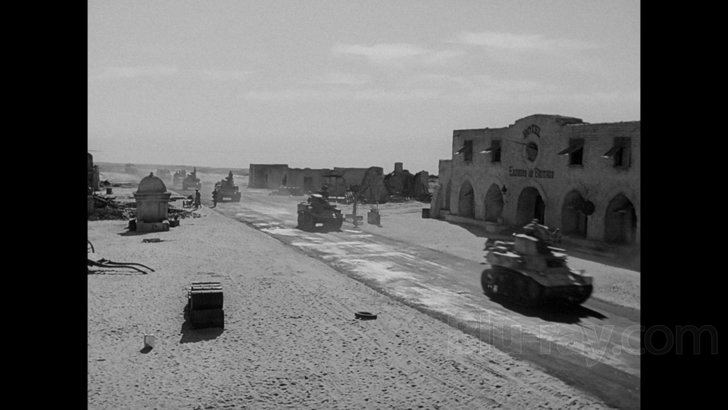
Presented in an aspect ratio of 1.35:1, encoded with MPEG-4 AVC and granted a 1080p transfer, Five Graves to Cairo arrives on Blu-ray courtesy of Eureka Entertainment.
The biggest issue with the current technical presentation of the film is that it is very, very inconsistent. For example, there are different types of close-ups -- some that feature plenty of natural light and some that come with different shades of light and shadow -- that can look decent, even good. But a lot of the visuals that are supposed to convey proper depth and clarity are routinely struggling and instead produce different degrees of flatness and even layered smearing. Quite often, but primarily during darker footage, grain loses its consistency as well, producing additional issues that become noticeable on a bigger screen. Needless to say, delineation isn't optimal, so the proper filmic sharpness that a good modern 4K master will produce simply isn't there. The grading job is good, but from time to time it feels like the blacks could have been managed better to offset issues that were inherited (see screencapture #3). Image stability is good, but some sporadic unevenness remains. My score is 3.25/5.00. (Note: This is a Region-B "locked" Blu-ray release. Therefore, you must have a native Region-B or Region-Free player in order to access its content).
Five Graves to Cairo Blu-ray Movie, Audio Quality 
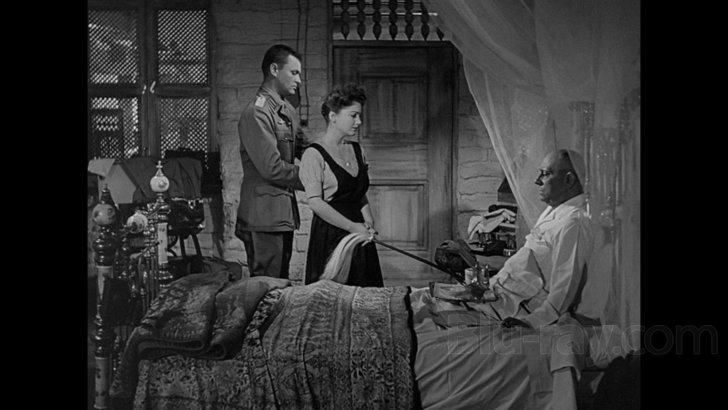
There is only one standard audio track on this Blu-ray release: English LPCM 2.0. Optional English SDH subtitles are provided for the main feature.
The lossless track is good. Obviously, it has a fair share of limitations -- most of which become very noticeable whenever Miklós Rózsa's score becomes prominent -- but it actually sounds very healthy. Its dynamic amplitude is very modest and from time to time it even feels like the audio become a tad too 'thin', but I personally am not surprised to hear such unevenness in a film from the early '40s. There are no audio dropouts, digital distortions, or other similar anomalies to report in our review.
Five Graves to Cairo Blu-ray Movie, Special Features and Extras 
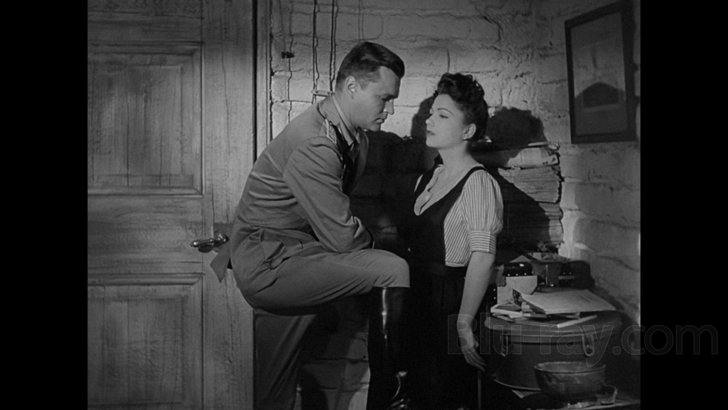
- Trailer - a remastered original trailer for Five Graves to Cairo. In English, not subtitled. (3 min).
- Radio Adaptation - presented here is an archival radio adaptation of Five Graves to Cairo from Lux Radio Theatre, starring Anne Baxter, Francho Tone, Otto Preminger, and host Cecile B. DeMille. It was originally aired on December 13, 1943. In English, not subtitled. (60 min).
- Billy Wilder on His Early Films - presented here is a segment from Volker Schlöndorff's documentary "Billy, How Did You Do It?". In English and German, with imposed English subtitles where necessary. (12 min).
- Commentary - in this new audio commentary, critic Adrian Martin discusses in great detail the genesis of Five Graves to Cairo, the era and conditions under which the film emerged, its tone and style, Lajos Biró's play that inspired it, Billy Wilder's career, etc.
- Booklet - an illustrated collector's booklet featuring new writing by critic Richard Combs, an archival article from 1944 about Billy Wilder and Charles Brackett, and technical credits.
Five Graves to Cairo Blu-ray Movie, Overall Score and Recommendation 
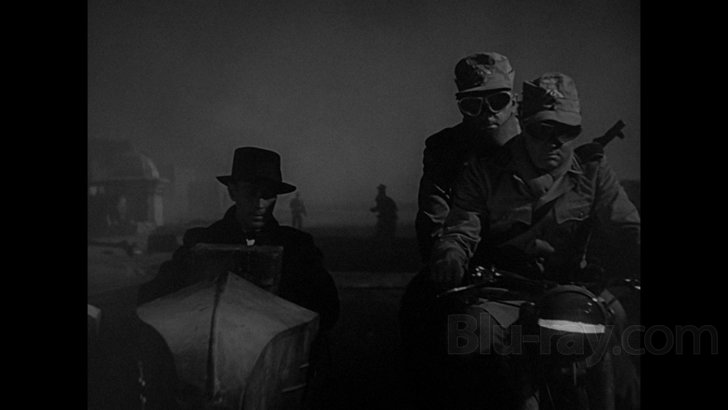
If Billy Wilder knew and understood who Field Marshal Erwin Rommel was he either could not communicate his knowledge to Erich von Stroheim or failed miserably while crafting his persona in the original screenplay for Five Graves to Cairo. Yes, his film was meant to be a propaganda piece so it is not shocking to see that it struggles to be objective, but the original material is so poorly handled and its presentation so blatantly unrealistic that the end product is actually one big and unbearably dull farce. The great Akim Tamiroff has a few memorable scenes, but they are not enough to save the film. It is a massive, quite embarrassing misfire.
Similar titles
Similar titles you might also like

Tobruk
1967

Ice Cold in Alex
Vintage Classics | 60th Anniversary Edition
1958

Topaz
1969

The Admiral: Roaring Currents
Myeong-ryang
2014

The Front Line
고지전 / Go-ji-jeon
2011

36 Hours
Premium Collection
1965

Sahara
Indicator Series | Limited Edition
1943

Play Dirty
1969

Went the Day Well?
Vintage Classics
1942

Farewell
2009

Beasts of No Nation
2015

The Eagle Has Landed
1976

Omar
2013

Operation Chromite
2016

Eye of the Needle
1981

Lion of the Desert
1980

Cloak and Dagger
Masters of Cinema
1946

Eye in the Sky
2015

Courage Under Fire
1996

Pioneer
Pionér
2013
